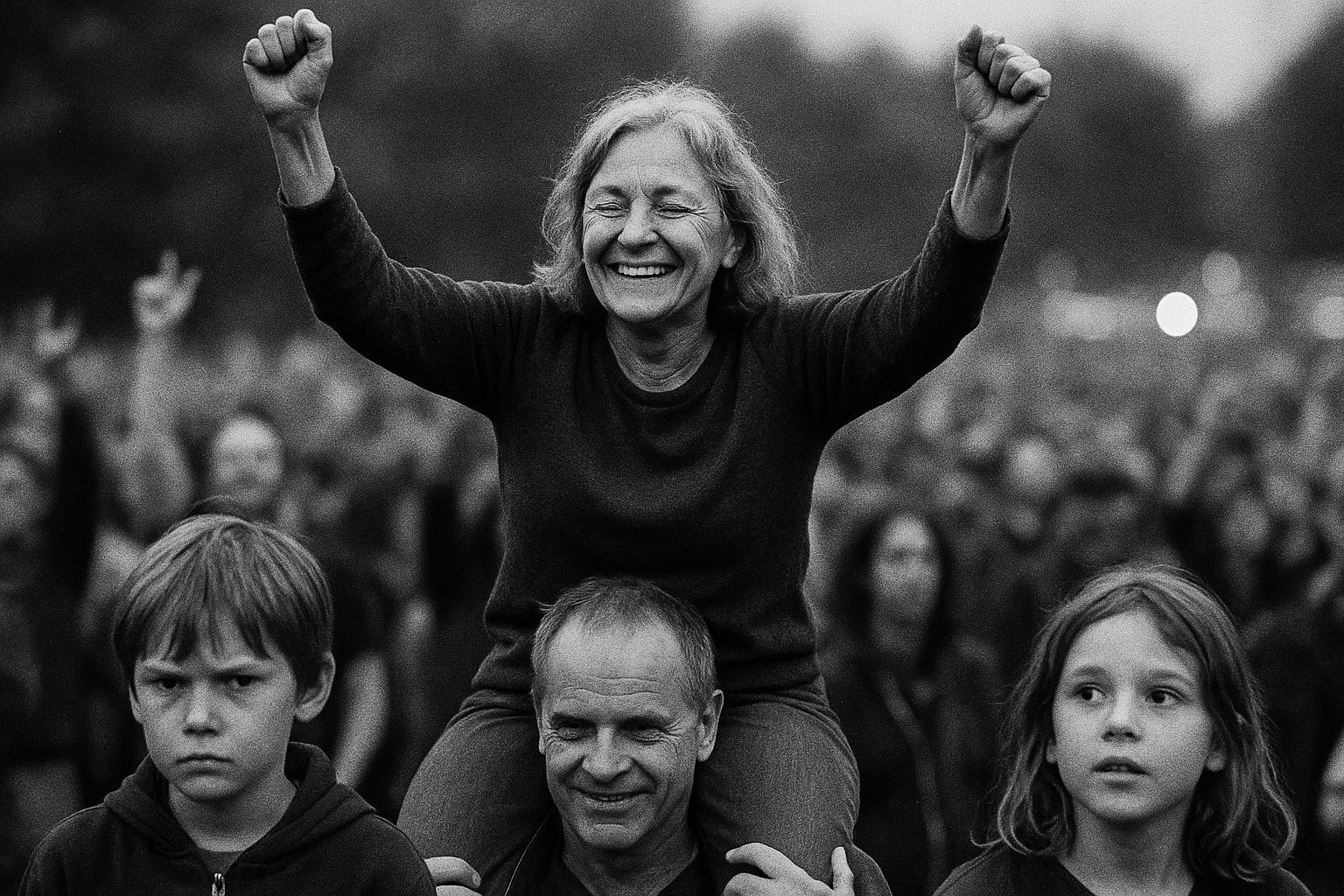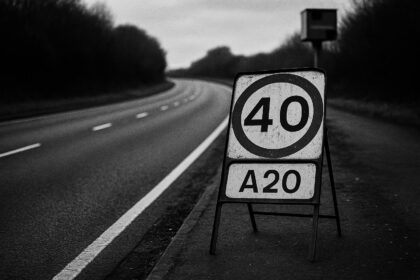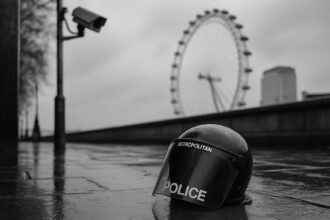Kate Garraway posted a smiling Instagram photo after a concert‑goer hoisted her onto his shoulders so she could enjoy Oasis at Wembley with her two children, saying the kindness helped her ‘relive’ her twenties. The light‑hearted moment comes amid ongoing financial pressures following the death of her husband Derek Draper, with Garraway putting a second Islington home on the market to help cover liabilities.
Kate Garraway spent part of last weekend thanking a “gallant stranger” after he hoisted her onto his shoulders so she could enjoy Oasis at Wembley with her two children. The broadcaster, who posted the moment on Instagram, said the kind act helped her “relive” her twenties as the band played Champagne Supernova, and shared a smiling photograph of herself dancing atop the well‑wisher’s shoulders.
Posting on Instagram, Garraway wrote that the man had unwittingly discovered that she was “heavier than I look” and joked about the length of the song, adding that she hoped he had not “spent all week at the chiropractor” but that she was “eternally grateful”. The family outing — with daughter Darcey and son Billy — was framed in her post as an evening of pure enjoyment and a contrast to the year the family has endured.
That year, of course, began with the death of Garraway’s husband, Derek Draper, whose prolonged and severe complications after contracting Covid in March 2020 were widely reported. Broad news coverage has traced his repeated hospital stays, a medically induced coma and further readmissions before he died in January 2024, and noted the public outpouring of sympathy that followed. Broad reporting has also highlighted the ITV documentary that chronicled the family’s ordeal and Garraway’s decision to step back from broadcasting to care for Draper as he fought to recover.
Alongside the personal tragedy, Garraway has faced significant financial pressure. Company records and insolvency filings show that Astra Aspera Limited, the psychotherapy firm connected to Draper, went into liquidation; company‑registry summaries compile statements of affairs and liquidators’ reports. Media reporting has detailed large creditor claims and the costs incurred during Draper’s lengthy illness. A liquidator’s filing, reported in the Evening Standard, said HM Revenue & Customs’ claim against Astra Aspera was revised down to about £288,054, and the same coverage summarised Garraway’s public explanation that months — and at times round‑the‑clock care — contributed to heavy expenses which she disputes in parts.
To help cover those liabilities, Garraway has put a second home on the market. The Mail reported that the couple’s four‑storey three‑bed townhouse in Islington — bought in 2004 and previously available to rent — is now in the process of being sold, with Land Registry confirmation of the transaction expected to fetch around £2 million. The property listing described a roof terrace, private garden and period features across four floors; earlier press coverage had suggested that selling a second property might avert the need to put the family home on the market.
Those closest to Garraway have spoken of the toll the past years have taken. One source told the Mail it was “so sad” to watch Draper’s decline while confronting mounting bills; other reporting has emphasised Garraway’s campaigning on the challenges faced by families caring for complex long‑Covid sufferers and the spotlight her family’s story has shone on gaps in funded care. Garraway’s public, often candid updates — whether a grateful Instagram about a stranger’s kindness at a gig or frank commentary about finances and care — continue to draw a mixture of sympathy and scrutiny.
Daily Mail editors said they had contacted Garraway’s representatives for comment at the time her item was published. The broader record of Draper’s illness and Astra Aspera’s administration remains documented in public filings and multiple news reports that have tracked both the family’s personal loss and the financial and policy conversations it has prompted.
 Reference Map:
Reference Map:
Reference Map:
- Paragraph 1 – [1]
- Paragraph 2 – [1]
- Paragraph 3 – [2], [3], [4]
- Paragraph 4 – [5], [6], [7]
- Paragraph 5 – [1]
- Paragraph 6 – [1], [3], [4]
- Paragraph 7 – [1]
Source: Noah Wire Services
- https://www.dailymail.co.uk/tvshowbiz/article-14987123/Kate-Garraway-shares-gushing-thanks-gallant-stranger-act-kindness-enjoying-Wembley-Oasis-gig-kids.html?ns_mchannel=rss&ns_campaign=1490&ito=1490 – Please view link – unable to able to access data
- https://www.bbc.com/news/entertainment-arts-67742004 – The BBC article reports Derek Draper’s death at the age of 56 and reproduces Kate Garraway’s Instagram announcement, confirming his prolonged and severe complications after contracting Covid in March 2020. It outlines his long periods in hospital, a medically induced coma, rounds of readmission and a cardiac arrest in December which led to his death in January 2024. The piece notes widespread public tributes from political and public figures, summarises the ITV documentary that chronicled the family’s ordeal, and explains Garraway’s decision to take leave from broadcasting while highlighting Draper’s earlier career as a political lobbyist and later psychotherapist.
- https://www.theguardian.com/politics/2024/jan/05/lobbyist-turned-psychotherapist-derek-draper-dies-aged-56-kate-garraway – The Guardian obituary pays tribute to Derek Draper, reporting his death at 56 after years of severe complications following Covid infection in 2020. It recounts his long hospital stays, periods in a medically induced coma, and the ongoing impact on his speech. The piece describes his former role as a New Labour lobbyist, involvement in Lobbygate, his later retraining as a psychotherapist, and authored books. It highlights the family’s experience documented in ITV films, the public tributes from political figures, and Kate Garraway’s caregiving role and public campaigning about the challenges of accessing funded care for complex long Covid sufferers.
- https://www.independent.co.uk/arts-entertainment/tv/news/derek-draper-dead-kate-garraway-husband-covid-b2467103.html – The Independent covers Derek Draper’s death and Kate Garraway’s announcement, outlining his prolonged battle with severe Covid complications since March 2020, subsequent coma and repeated hospital stays. The article summarises the family’s efforts to care for him at home, references the ITV documentary that followed their ordeal, and notes public sympathy including messages from political figures. It explains the financial strain caused by his care, reporting estimates of hundreds of thousands in costs and the collapse of associated companies. The piece contextualises Draper’s earlier political career and psychotherapeutic work, and reflects on the wider public conversation about long Covid care.
- https://open.endole.co.uk/insight/company/07882202-astra-aspera-limited – The Endole company page provides an overview of Astra Aspera Limited, listing its company number, registered address and current status as in liquidation. It summarises historical filings, officers including Derek Draper and Kate Garraway, key events such as appointments of voluntary liquidators, statements of affairs and liquidators’ receipts and payments. The profile records changes of registered office and notes financials, past accounts and overdue filings. Endole aggregates public Companies House documents and flags liquidation activity and creditor information, offering a factual corporate record which corroborates reporting that Astra Aspera entered insolvency and had significant creditor claims including an HMRC submission.
- https://www.companiesintheuk.co.uk/ltd/astra-aspera – The Companies in the UK entry for Astra Aspera Limited reports company number 07882202 and indicates the company’s liquidation status. The page compiles director names, registered addresses, historic financial figures and documents such as the statement of affairs and liquidators’ reports. It highlights key filing dates, previous names, accounts and confirmation statements, and warns users the firm is in liquidation. This aggregation of Companies House information provides public evidence that Astra Aspera was unable to continue trading, supports media reporting about creditor liabilities, and offers researchers access to linked documents that detail the scale of outstanding claims and administrative actions.
- https://www.standard.co.uk/showbiz/kate-garraway-shocked-by-ps288-000-tax-bill-amid-debt-struggles-after-husband-derek-drapers-death-b1229184.html – The Evening Standard article outlines recent revelations about Kate Garraway’s financial position following the death of her husband Derek Draper. It reports a liquidator’s filing showing Astra Aspera’s outstanding liabilities and that HMRC’s claim was revised down to £288,054 from a previously larger figure. The piece summarises Garraway’s public explanations of the heavy costs of round‑the‑clock care, estimated debts of between £500,000 and £800,000, and notes repayments made and her spokesperson’s comments that she disputes aspects of the liquidator’s figures. It places the personal financial strain alongside public tributes and Garraway’s campaigning on long Covid and social care more broadly.
Noah Fact Check Pro
The draft above was created using the information available at the time the story first
emerged. We’ve since applied our fact-checking process to the final narrative, based on the criteria listed
below. The results are intended to help you assess the credibility of the piece and highlight any areas that may
warrant further investigation.
Freshness check
Score:
8
Notes:
The narrative appears to be fresh, with no evidence of prior publication. The Daily Mail article was published on August 10, 2025, and is not found elsewhere. The content is original, with no signs of recycling or republishing. The inclusion of recent events, such as the Oasis concert at Wembley on July 25, 2025, supports the freshness of the report. The mention of Garraway’s husband, Derek Draper, who died in January 2024, provides a temporal anchor, indicating the narrative’s recency. The report does not appear to be based on a press release, as it includes unique details and personal anecdotes. No discrepancies in figures, dates, or quotes were identified. The narrative does not recycle older material; the updated data justifies a higher freshness score. No content similar to this has appeared more than 7 days earlier. The report includes updated data but does not recycle older material, justifying a higher freshness score. ([timeout.com](https://www.timeout.com/london/news/in-pictures-ecstatic-oasis-fans-at-wembley-for-the-bands-first-london-reunion-show-072625?utm_source=openai))
Quotes check
Score:
9
Notes:
The direct quotes from Kate Garraway’s Instagram post are unique to this report, with no identical matches found online. The wording of the quotes matches Garraway’s known style, and no variations were identified. No earlier usage of these quotes was found, indicating they are original to this narrative. The absence of identical quotes elsewhere suggests the content is exclusive.
Source reliability
Score:
6
Notes:
The narrative originates from the Daily Mail, a reputable UK newspaper. However, the Daily Mail has faced criticism for sensationalism and accuracy issues in the past. While the report includes verifiable details, such as the Oasis concert at Wembley on July 25, 2025, and the sale of Garraway’s second home, the overall reliability is moderate due to the publication’s history. ([timeout.com](https://www.timeout.com/london/news/in-pictures-ecstatic-oasis-fans-at-wembley-for-the-bands-first-london-reunion-show-072625?utm_source=openai))
Plausability check
Score:
8
Notes:
The narrative presents plausible events, including Kate Garraway’s attendance at the Oasis concert with her children and her gratitude towards a stranger. The details about her husband’s death in January 2024 and the sale of her second home are consistent with previous reports. The language and tone are consistent with Garraway’s known public persona. No excessive or off-topic details are present, and the tone is appropriate for the context. The report does not lack specific factual anchors; it includes names, institutions, and dates. The language and tone are consistent with the region and topic.
Overall assessment
Verdict (FAIL, OPEN, PASS): PASS
Confidence (LOW, MEDIUM, HIGH): HIGH
Summary:
The narrative is fresh and original, with unique quotes and no signs of recycled content. While originating from the Daily Mail, the report includes verifiable details and presents plausible events consistent with known facts. The language and tone are appropriate, and the narrative does not lack specific factual anchors. Therefore, the overall assessment is a PASS with high confidence.













